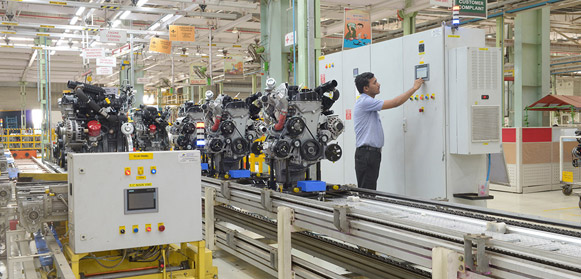In 1947, Mahindra & Mahindra got into the automotive business assembling Willys Jeeps. Licensed from an American automobile maker called Willys-Overland Motors and built for military applications, the Willys became famous for its reliability in tough Indian conditions. Seven decades later, Mahindra now makes a wide range of trucks, cars, three-wheelers, and two-wheelers, and is one of India’s largest vehicle makers. The company, which has assembly plants in China, the UK, the US, and India, has built a reputation for making rugged and reliable vehicles.
Mahindra’s current global presence holds important lessons on how early investments in research and development in manufacturing technologies has established the company as a premier maker of utilitarian vehicles.
Modern automobiles have become more complex than ever before and so are the techniques by which manufacturers produce them. From conceptualising and designing to assembling and manufacturing, the process is both expensive and time-consuming. On the business side, car makers have to face growing global competition, reducing time-to-market, accelerating production ramp-up to meet increasing demand, and managing a flexible production line to accommodate vehicle customization.
These challenges mean that manufacturers have to produce multiple vehicles in multiple variations at one location. Delivering this flexible manufacturing capability while reducing downtime and maximizing output makes a critical difference in the automotive world.
There is a growing realization that a development strategy focused on manufacturing will help create jobs and improve living conditions, and offer direct benefits for skill development, education, and much more.

Image: iStockphoto
Increasing manufacturing flexibility
In addition to these pressures, Mahindra knew it had to keep costs in check for the price-sensitive Indian market while complying with global quality standards. To achieve this, the company partnered with Siemens to help deliver its vision of reliability, affordability, and fuel efficiency across different lines of vehicles. This involved incorporating automation and digitalization across the entire value chain—from designing to planning to engineering to execution.
Siemens solutions to Mahindra included design and software solutions for Product Lifecycle Management, Siemens Technology for Powertrain (STP), and integrated automation. For Powertrain, the solution included SINUMERIK, SINAMICS, SIMOTICS, and SIMATIC controls and drives as well as CNC and PLC-controlled machines that are linked via a Profinet interface.
A digitalized platform called the Mahindra Product Development System enables a flexible system that can quickly translate market requirements into a viable vehicle platform—thereby increasing the number of product launches and reducing time taken for new product launches.
Further, Siemens integrated its automation solutions into the “Poka-Yoke” manufacturing philosophy of Mahindra that helps an equipment operator avoid mistakes. Its purpose is to eliminate product defects by preventing, correcting, or drawing attention to human errors as they occur; in effect, to attain greater precision and consistency in manufacturing, following the ‘first-time right’ approach.
Siemens implemented a proven concept aimed at automating production and assembly of engines, axles and transmission. In this approach, the project team develops the desired automation solution, including the communications, software, engineering, training, spare parts and service, that are tailored to the respective production areas and to the specific project requirements.
As Mahindra’s strategic project partner, Siemens also provided solutions to optimize life cycle costs viz. knowledge management, troubleshooting packages, and training to help Mahindra achieve their Project Management objectives.
This kind of a comprehensive tailor-made solution not only helps the automaker increase manufacturing flexibility, but also improves supply-chain integration and gives access to real-time production information. And, for the customer, this translates into more affordable vehicles with features on par with those sold globally.

Image: iStockphoto
Embracing Industry 4.0
It is hard to overemphasize the importance of adopting Industry 4.0 technologies for the automotive industry and manufacturing in general. Industry 4.0, here, is an umbrella term that includes automation, Internet-of-Things (IoT), cloud computing, and other technologies which help create what are being called “smart factories”.
In these smart factories, processes are monitored by cyber-physical systems, and machines connected through IoT communicate with each other and humans to take decentralized decisions. This digitalization of the factory floor is rapidly transforming how companies develop products and respond to customer needs.
Industry 4.0 offers a special opportunity for Indian industries to even the playing field with global giants. Smart factories are helping companies develop and manufacture new products and better respond to customer needs regardless of whether they are a small, medium, or big manufacturer.
Digitalization helps the automotive industry to turn ideas faster and more efficiently into successful vehicles. Adoption of these technologies more widely can bring Indian parts and vehicles up to global standards, and therefore, make them export-ready—yet another major benefit.
The automotive industry is the technological trendsetter among manufacturing industries. It keeps evolving at a fast pace and is a driver of the new era of digitalization. However, companies need strategic partners to guide them through the processes of conceptualising, planning, designing, assembling, and manufacturing to maximize productivity gains. Siemens’ customised solutions for the automotive industry allows enterprises to derive better value out of all their major processes.


